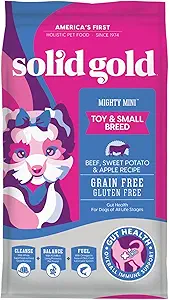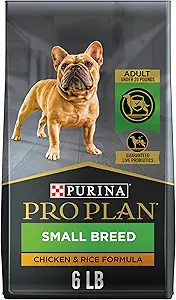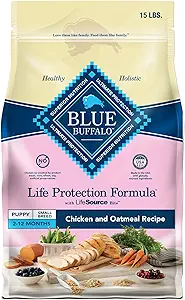Small-breed puppies are more than adorable companions; they often play a significant role in providing emotional support and enhancing the well-being of their human partners. Ensuring they receive the right nutrition is crucial—not only for their physical development but also for maintaining the energy and temperament that make them such comforting presences in our lives.
Understanding the Unique Needs of Small-Breed Puppies
Small-breed puppies have faster metabolisms and higher energy requirements per pound than larger breeds. They also mature more quickly, necessitating a diet rich in high-quality proteins, fats, calcium, and phosphorus to support rapid growth and development. Feeding them smaller, calorie-dense meals multiple times a day helps maintain stable blood sugar levels, preventing fatigue and weakness. Purina
Top Recommended Foods for Small Breed Puppies
- Solid Gold Mighty Mini Lamb, Sweet Potato & Cranberry
This grain-free formula is tailored for small mouths and sensitive stomachs. It includes omega-3 and -6 fatty acids to support brain development, ensuring your puppy remains alert and responsive—a key trait for emotional support animals.

- Purina Pro Plan Puppy Small Breed Formula
This food is rich in DHA from fish oil, which supports brain and vision development. Its high protein content aids in building lean muscles, keeping your pup active and engaged.

- Blue Buffalo Life Protection Formula Small Breed Puppy
This formula, featuring real meat as the first ingredient, provides essential proteins and carbohydrates for energy. It also contains calcium and phosphorus for strong bones and teeth.

Feeding Tips for Optimal Health and Bonding
- Consistent Feeding Schedule:
Establishing regular meal times helps build a routine, which benefits both the puppy and the owner, especially those who rely on structure for mental well-being.
- Monitor Portion Sizes:
Use measuring cups or a kitchen scale to ensure appropriate portions, prevent overfeeding, and maintain a healthy weight. Overfeeding can lead to obesity and related health issues, while underfeeding can result in malnutrition and stunted growth. Purina Institute
- Hydration is Key:
Always provide fresh water to keep your puppy hydrated. Adequate hydration is essential for digestion, nutrient absorption, and maintaining energy levels, supporting overall health and vitality.
- Gradual Food Transition:
Mix a new food with the current one over several days to prevent digestive upset. This gradual transition allows your puppy’s digestive system to adjust to the new food, reducing the risk of upset stomach or diarrhea.
The Emotional Impact of Proper Nutrition
A well-nourished puppy is more likely to exhibit the calm and affectionate behavior that comforts individuals dealing with mental health challenges. Their vitality and responsiveness can uplift moods, reduce stress, and offer a sense of grounding and therapeutic companionship, reminding us of our pets’ invaluable role in our emotional wellness.
By selecting the right food and feeding practices, you’re promoting your petite pup’s health and enhancing the invaluable support they provide in your journey toward emotional wellness.




